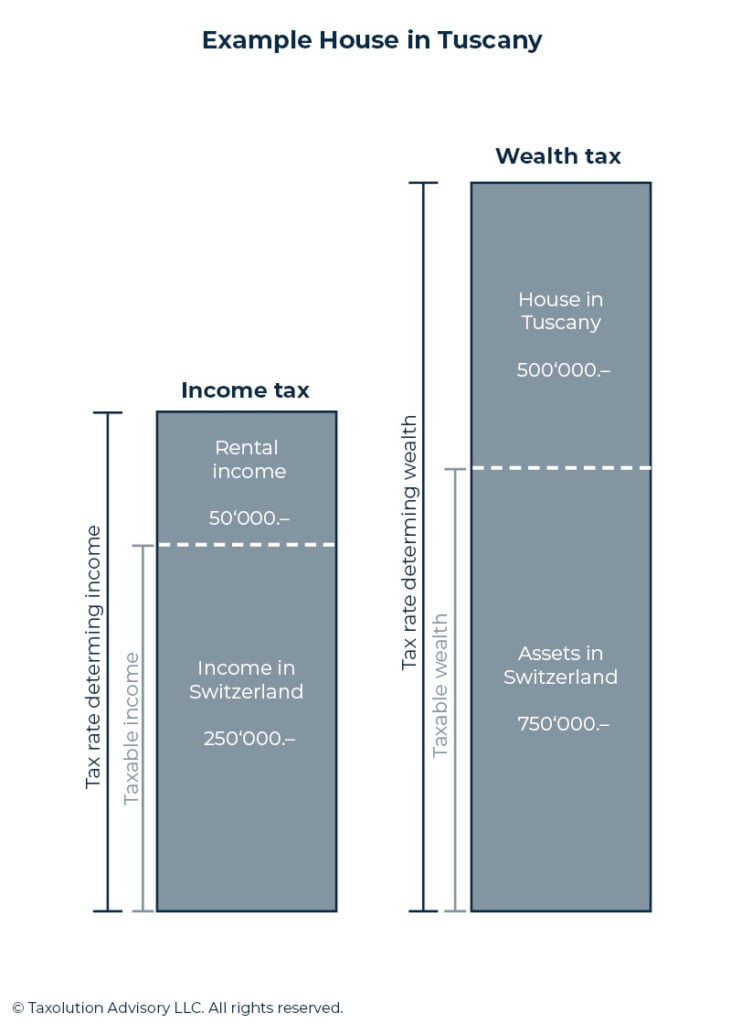Taxation of Properties Abroad

There is often a misunderstanding that the ownership of real estate abroad does not have to be declared in the tax return by a taxpayer in Switzerland. However, this is not correct. In any case, real estate abroad must always be declared in the Swiss tax return. We explain why this is necessary and how the ownership of real estate abroad affects your tax burden in Switzerland.
« If you fail to declare your real estate and property located abroad on your Swiss tax return, you are potentially committing tax evasion, as this will result in you being charged too low a tax rate on your total income and assets. »
Is the Value of the Foreign Property Taxed in Switzerland?
Tax Abroad…
In the country where your property or land is located, it will be taxed based on the local tax laws. Switzerand exempts foreign real estate from taxation but takes their income and valueinto account to determine the applicable tax rate.
…Declare in Switzerland
Therefore you still have to declare your foreign properties in your tax return.
If you fail to declare your real estate and property located abroad on your Swiss tax return, you are potentially committing tax evasion, as this will result in you being charged too low a tax rate on your total income and assets.
So, the important thing is: declare your foreign real estate and properties.
How Does the Declaration of Foreign Ownership Affect the Tax Burden in Switzerland?
The Swiss tax authorities determine the value of your real estate abroad either by the imputed rental value if you use it yourself, or by your rental income if you rent it out.
The income or earnings from your foreign real estate are then included in the calculation of the income tax rate as well as the wealth tax rate:
| Income Tax | Wealth Tax |
| Income from the property (both rent and imputed rent) will be considered for the calculation of the income tax rate. | The taxable value of the property will be considered for the calculation of the wealth tax rate. |
The taxable value of the property will be considered for the calculation of the wealth tax rate.
Illustration of the Taxation With an Example
For example, if you own a house in Tuscany worth CHF 500,000 and rent it out for CHF 50,000 per year, the value of the property is not taxed as an asset in Switzerland and the rental income is not taxed as income. This is possible because Switzerland has concluded a double taxation agreement with Italy, which is intended to avoid such cases.
Good to know, Switzerland exempts foreign real estate from taxation already based on its internal law. Should a double tax treaty with a certain country not exist, your non-Swiss property will therefore still be exempt from taxation.
You only pay taxes on your income and property in the country where the property is located or where the income is generated – in the example case in Italy.
The CHF 500,000 will be added to your total assets when determining your wealth tax rate. Likewise, the CHF 50,000 will be added to your income.
Capital gains from sale of foreign properties are not taxable in Switzerland but should be declared so that the Swiss tax authority can comprehend the evolution of your net wealth between each tax period.
For example, if you have an income in Switzerland of CHF 250,000, the income tax rate is calculated based on CHF 300,000, but you only have to pay tax on CHF 250,000 of that income.
It is the same for wealth tax. Assuming you have assets in Switzerland of CHF 750,000, your total assets are CHF 1,250,000, which is used as the basis for calculating the wealth tax rate. At this tax rate, however, you only have to pay tax on your domestic wealth of CHF 750,000.
What Happens in Case of Non-declaration?
You can be confident that sooner or later the Swiss tax authorities will become aware of your properties abroad. This has been greatly simplified with the introduction of the Automatic Exchange of Information (AEOI), in which many countries have joined forces to make tax evasion massively more difficult.
The Swiss tax authorities are therefore networked with the tax authorities in other countries. Although real estate are not subject to the exchange of information, the authorities might receive information about bank accounts abroad linked to the property. Usually, the owner holds a bank account locally to transact all payments and income (e.g. gas, electricity, water, mortgage interests, property tax, rental income, etc.) from that specific property. This might cause further investigations.
Escaping Punishment With Voluntary Disclosure
If you were not aware so far that you must declare your foreign real estate and properties in your tax return, it is recommended to do so now. If the Swiss tax authorities have not yet approached you, do not wait until they do, otherwise you risk a penalty.
Instead, file a voluntary disclosure. In this case, you will have to pay the missed taxes for the previous years plus interest on arrears. In case this is your first voluntary disclosure in your life a penalty can be escaped.
If you wait too long and the tax authorities find out that you have committed tax evasion, in the worst case scenario you will have to face an additional payment of three times the additional tax plus a fine.
Foreign Property to Save Taxes?
In some cases, taxes can be saved by owning a property abroad. We show you here under which circumstances this is possible.
When Paying the Maximum Tax Rate
If you already pay the maximum rate of tax on your income and/or your assets, the purchase of an additional property abroad will not affect your tax burden in Switzerland at all, because you are already paying the maximum.
Reduction of the Tax Rate
However, there is also the case that a property abroad has a reducing effect on the tax rate in Switzerland. This occurs when a so-called profit cost surplus arises. In this case, the deductible costs for the maintenance of the property, as well as the administration and insurance, exceed the gross income or the imputed rental value. Since owning the property is a negative business for you, this negative income can be offset against the tax rate in some cantons, which reduces it.
Value Preservation and Maintenance Costs Tax Deductible
Swiss tax law also allows all costs incurred to maintain and preserve the value of the property (both in Switzerland and abroad) to be deducted from tax. This means that you can fully deduct the renovation costs, costs for painting, for electrical work etc. for your foreign property from your taxable income.
If you invest in modernizations that increase energy efficiency, you may even be able to benefit from government subsidies and fully deduct the costs of these measures from your taxes as well.
Conclusion: Declare Foreign Real Estate in Switzerland
Even if foreign real estate and properties are taxed in the respective country, the owner must still declare it in the Swiss tax return, otherwise you will be liable to potential prosecution for tax evasion. The income from the property and the value are included in the calculation of your tax rate as part of the progression provison.
Owning a property abroad can also have a positive effect on your tax burden and tax rate. For example, you can fully deduct all maintenance costs from your taxes. Worth mentioning is also that mortgage and interests thereof are also considered as tax deductible expenses.
Contact us to calculate exactly what you can save for your specific case. If you have to declare foreign real estate, we will support you in making a voluntary declaration without penalty.



